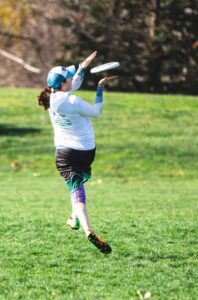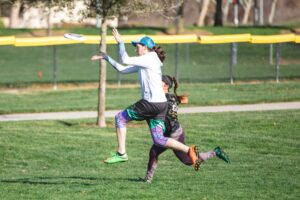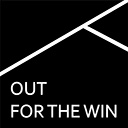
“I’m most proud of the role I seem to have played in helping others come out in ultimate” ©Jenna Weiner
Pre-pandemic, I played ultimate frisbee on a mixed gender team in the club division, which is the main division for ultimate in the US outside of college and which has three gender-based divisions within it: men’s, women’s, and mixed. I also played in seasonal local leagues that were both women’s and mixed leagues. I knew about ultimate frisbee from a pretty young age since my dad played when he was in college and taught my brother and I the basics as we were growing up.
However, I didn’t really get into ultimate until college at UC Berkeley, where I started playing with an intramural team made up of marching band members. From there I found my way to playing on a college team for two years before starting club in summer 2017. I started playing ultimate simply because it is an amazingly fun sport. You get to run around, throw discs and catch them, and it’s really easy to pick up at a basic level. From there I got hooked by the community, which is wonderful and welcoming, and I could travel around the country and the world to meet up and play with other ultimate players, at least when travel was more feasible.
“The timing of my identity realization ended up being nearly perfect for me as an athlete, as I was about to move cities to start graduate school, and moving allowed me to start fresh with a new ultimate community as I started to transition.”
I was 22 when I first really realized I was transgender, although there were signs that I was trans for at least a decade before. Before I knew I was trans I had convinced myself that I was a very normal cisgender, heterosexual guy, and so it wasn’t until I was able to match up my experiences with others’ experiences that I put the pieces together that I am a trans woman. The timing of my identity realization ended up being nearly perfect for me as an athlete, as I was about to move cities to start graduate school, and moving allowed me to start fresh with a new ultimate community as I started to transition. I also had some college eligibility left when I transitioned and so had the opportunity to play college women’s ultimate for a season, which I wouldn’t have been able to do had I realized any later.
TAKING A LEAP
I came out to people and teams gradually in Fall 2016 and Spring 2017 as it seemed appropriate, especially as I made the move to the women’s college team. How I came out varied on the person and situation: some during drives to and from tournaments, some over food, some during walks around campus, and others randomly when the topic came up. And then an article I wrote for an ultimate online magazine Skyd in March 2017 was my coming out letter to the ultimate community more broadly.
On the field, I’m most proud of times when my teams have done well despite being underdogs, such as when a team of mine in college finished second in a regional tournament with nine players. However, I’m more proud of my off-field achievements and their impact in ultimate. When I first came out to the broader ultimate community with that article in March 2017, there were only a few out trans people in ultimate that I knew of, one of whom lived in Australia. So when I wrote tit I was taking a leap that ultimate would be accepting of me as a trans woman and it has been, far more so than I could have ever anticipated.
“I was worried about not being accepted in ultimate, a game that I loved dearly, but when I was accepted that fear basically went away and things got better from there. My teammates across multiple different teams nearly all reacted positively with support, welcome, and acceptance.”
In the years that have followed my coming out I’ve seen progressive policy changes, more thoughtful conversations, and more and more trans and non-binary players coming out in ultimate. While the policy changes have been great and are likely the most impactful long-term, I’m most proud of the role I seem to have played in helping others come out in ultimate. Over the almost four years that I’ve been out in ultimate there has been a steadily increasing number of out trans and non-binary players, including several that have specifically reached out to me to say how I’ve helped lead the way. This is the power of representation. This is the power of out, vocal, and visible LGBTQ+ athletes. Those who have taken the steps before can help lead the way for those who come after. I’m excited that this is happening because it feels like I’ve made a difference and that trans and non-binary people are feeling like ultimate is becoming more inclusive and welcoming of them. That has been my proudest sporting achievement, done entirely off the field.
WORK IN PROGRESS

“To a young LGBTQI athlete today I would tell that they are valued, that there is a place in sports for them, and that their queerness doesn’t take anything away from their athletic accomplishments, that last part especially for young trans women athletes.” ©Jenna Weiner
I was initially scared of the reactions of my teammates just because I didn’t know what their reactions would be, but once I started coming out to different people it got a lot easier. I was worried about not being accepted in ultimate, a game that I loved dearly, but when I was accepted that fear basically went away and things got better from there. My teammates across multiple different teams nearly all reacted positively with support, welcome, and acceptance. More broadly in ultimate the reaction has been similarly positive, and I’ve been accepted with open arms.
I didn’t have sponsors when I started transitioning, but I’ve actually been sponsored by some ultimate apparel companies since transitioning because I am an out transgender athlete in ultimate. I’ve worked with those companies to create new designs for ultimate jerseys and gloves that have LGBTQ/trans/non-binary inclusive messages, and have started to work with them on engaging with the disc golf community as well. Since the start of the pandemic, I have been moving more into the disc golf scene, and have been going through some of the same processes as in ultimate in coming out and sharing my story with some of the disc golf community.
I think in general ultimate is quite accepting of LGBTQI athletes, with a significant number of out gay, lesbian, and bi players, although this depends partially on what local community you’re in. There is also growing acceptance of trans athletes, although this is still a work in progress as ultimate has become more aware of trans athletes and trans issues in the last several years. The space to really grow for ultimate is in the acceptance of non-binary athletes in ultimate, as most of the structure of ultimate doesn’t really allow for non-binary identities to exist within the current norms of ultimate.
“The biggest room for improvement honestly probably comes with accepting trans athletes, more specifically trans women athletes, since even in seemingly progressive sports or areas trans women are not yet necessarily truly included or welcomed in sports.”
My country, the US, is simultaneously welcoming and unfriendly to queer athletes. In the last several years there have been more and more out LGBTQI athletes in the US, but there has been continued pushback to them, particularly trans women athletes like me. I don’t feel like the US does nearly enough for LGBTQI people, and it’s a similar situation for LGBTQI athletes specifically. However, I have seen an evolution in how LGBTQI athletes are accepted and treated, especially in the last decade or so and particularly in how more and more athletes are coming out. Big names like Megan Rapinoe, Sue Bird, and Caster Semenya come up in general, and for trans athletes I look to Andraya Yearwood, Chris Mosier, and Mack Beggs among others for how they’ve dealt with being very publicly out trans athletes.
The biggest room for improvement honestly probably comes with accepting trans athletes, more specifically trans women athletes, since even in seemingly progressive sports or areas trans women are not yet necessarily truly included or welcomed in sports. In sports or areas in which trans athletes are becoming more accepted, the next big step is moving away from binary assumptions, norms, and structures, and trying to better include non-binary athletes.
As a young LGBTQI athlete, I would have liked to have heard that it was okay to be me and still play sports, that my identities as an athlete and as a queer person were not mutually exclusive. To a young LGBTQI athlete today I would tell that they are valued, that there is a place in sports for them, and that their queerness doesn’t take anything away from their athletic accomplishments, that last part especially for young trans women athletes.
___
Follow Jenna on Twitter






